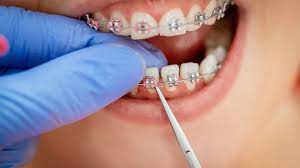If you’re considering orthodontic treatment, Braces 101 is the perfect starting point to understand the process of achieving a straighter smile. Whether you're a teenager or an adult, Dental Braces are one of the most effective ways to improve both the appearance and functionality of your teeth. In this guide, we’ll explore everything you need to know about braces—from how they work to how to care for them throughout treatment.
The Importance of Getting Braces:
Braces do more than just straighten teeth. They help correct bite issues, prevent future dental problems, and enhance your smile. By aligning teeth and jaws properly, braces contribute to better overall oral health and function, ensuring a lifetime of benefits.
Why braces are important for your oral health:
- Improves bite alignment: Correcting overbites, underbites, and crossbites for better function.
- Prevents dental issues: Reduces the risk of cavities, gum disease, and tooth wear.
- Enhances self-esteem: A straighter smile can boost confidence and improve your social life.
- Promotes better oral hygiene: Properly aligned teeth are easier to brush and floss effectively.
- Improves speech and chewing: Fixing misaligned teeth helps with clearer speech and better eating habits.
Braces are a long-term investment in both your dental health and personal confidence.
Risks to Consider Before Starting Treatment:
While braces offer many benefits, there are a few risks and considerations that every potential wearer should be aware of. Understanding these risks can help you prepare for the treatment process and minimize discomfort.
Potential risks associated with braces:
- Initial discomfort: It’s common to feel discomfort, especially in the first few days after getting braces or after an adjustment.
- Oral irritation: Brackets and wires can sometimes irritate the gums and the inside of the cheeks.
- Difficulty eating: Foods that are too hard, sticky, or chewy can damage braces or become trapped in them.
- Dental hygiene challenges: Braces make it more difficult to brush and floss properly, which can lead to plaque buildup if not maintained.
- Potential for broken brackets or wires: Accidents can happen, and sometimes, a bracket or wire may break or bend, requiring an emergency visit.
Though these risks exist, they can be easily managed with proper care and regular check-ups.
The Benefits of Braces for a Straighter Smile:
The benefits of braces go beyond simply improving your appearance. A straighter smile has long-term advantages for both your health and quality of life.
Key benefits of braces:
- Aesthetic improvements: Straight teeth create a more attractive smile that boosts confidence.
- Healthier teeth and gums: Correcting alignment helps prevent tooth decay, gum disease, and jaw problems.
- Better oral hygiene: When teeth are aligned, brushing and flossing become more effective, reducing the risk of plaque buildup.
- Correcting bite problems: Braces improve bite functionality, making it easier to chew and speak.
- Long-lasting results: After completing the treatment and wearing a retainer, your straight smile can last for years.
Ultimately, the benefits of braces extend far beyond cosmetic appearance, providing both functional and psychological advantages.
Preparing for Your Braces Journey:
Before you begin your treatment with braces, it’s important to prepare properly. Proper preparation helps ensure that the transition into orthodontic care is as smooth as possible.
How to prepare for braces treatment:
- Visit the dentist for a thorough check-up to ensure your teeth and gums are healthy before the braces are applied.
- Consider the timing of treatment: It’s essential to plan your treatment around your lifestyle (e.g., school, work, or special events).
- Learn about your options: Talk to your orthodontist about the types of braces (traditional metal, ceramic, or clear) and choose what works best for you.
- Stock up on braces-friendly foods: Soft foods like mashed potatoes, soups, and yogurt will be easier to eat during the first few days.
- Set expectations: Understand the treatment timeline (usually 18-36 months) and any follow-up visits needed for adjustments.
Proper planning and knowledge will set you up for a successful and comfortable orthodontic journey.
Aftercare: How to Care for Your Braces
Once you have your Dental Braces Treatment, taking good care of them is essential for ensuring that your treatment progresses as planned. Aftercare involves maintaining oral hygiene and avoiding habits that can damage your braces.
Braces aftercare tips:
- Brush your teeth thoroughly after every meal with a soft-bristled toothbrush to remove food and plaque from brackets and wires.
- Use wax on sharp brackets or wires that irritate your gums or the inside of your mouth.
- Floss daily with a special orthodontic floss or floss threader to clean between your teeth and braces.
- Avoid hard, sticky, or chewy foods that can damage your braces or get stuck in them.
- Attend regular check-ups with your orthodontist for adjustments and progress assessments.
Proper aftercare ensures that your braces treatment works as efficiently as possible while maintaining oral health.
FAQs:
How long will I need to wear braces?
Treatment generally lasts between 18 and 36 months, depending on the severity of your dental issues.
Do braces hurt?
Some discomfort is common after braces are applied and after adjustments, but this typically subsides after a few days.
Can I eat normally with braces?
While it may be difficult to eat hard or sticky foods, you can still enjoy most foods by cutting them into smaller pieces and avoiding certain restrictions.
Are there alternatives to traditional metal braces?
Yes, there are alternatives like clear braces or aligners (like Invisalign), which are less visible but may not be suitable for all cases.
Conclusion:
Braces 101 provides a comprehensive overview of what to expect during your orthodontic journey. From understanding the importance of treatment to learning how to care for your braces, the process of getting a straighter smile is well worth the effort. With proper care and guidance from your orthodontist, you can achieve the smile you've always wanted—one that will last a lifetime.





Comments